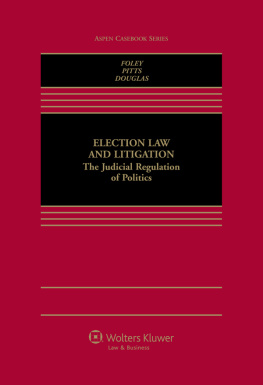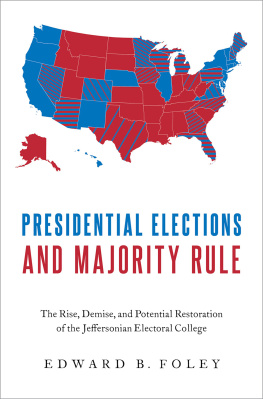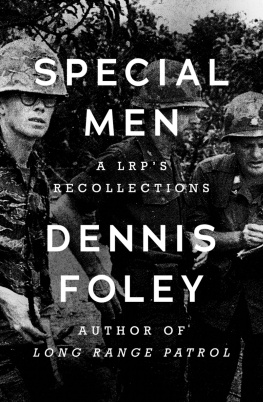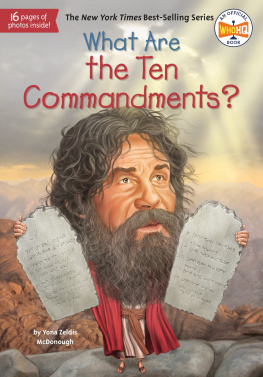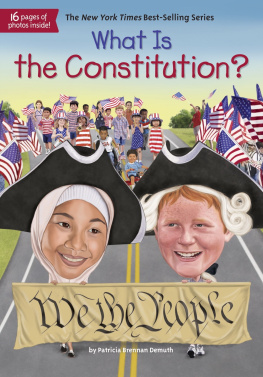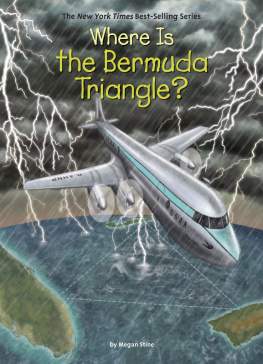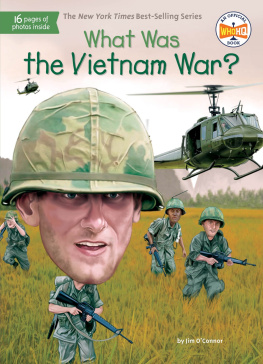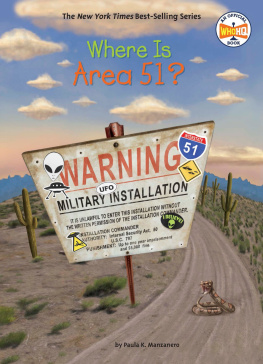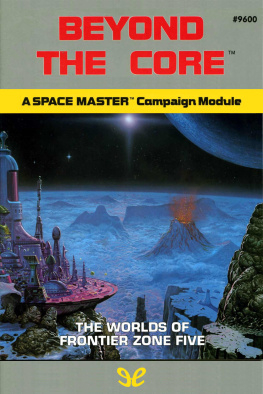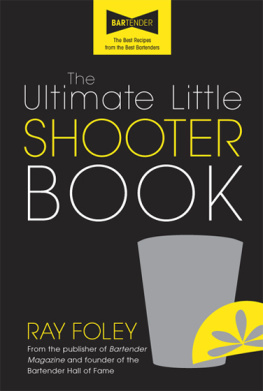Edward B. Foley - Election Law and Litigation
Here you can read online Edward B. Foley - Election Law and Litigation full text of the book (entire story) in english for free. Download pdf and epub, get meaning, cover and reviews about this ebook. year: 2014, publisher: Wolters Kluwer, genre: Politics. Description of the work, (preface) as well as reviews are available. Best literature library LitArk.com created for fans of good reading and offers a wide selection of genres:
Romance novel
Science fiction
Adventure
Detective
Science
History
Home and family
Prose
Art
Politics
Computer
Non-fiction
Religion
Business
Children
Humor
Choose a favorite category and find really read worthwhile books. Enjoy immersion in the world of imagination, feel the emotions of the characters or learn something new for yourself, make an fascinating discovery.
- Book:Election Law and Litigation
- Author:
- Publisher:Wolters Kluwer
- Genre:
- Year:2014
- Rating:4 / 5
- Favourites:Add to favourites
- Your mark:
- 80
- 1
- 2
- 3
- 4
- 5
Election Law and Litigation: summary, description and annotation
We offer to read an annotation, description, summary or preface (depends on what the author of the book "Election Law and Litigation" wrote himself). If you haven't found the necessary information about the book — write in the comments, we will try to find it.
Edward B. Foley: author's other books
Who wrote Election Law and Litigation? Find out the surname, the name of the author of the book and a list of all author's works by series.
Election Law and Litigation — read online for free the complete book (whole text) full work
Below is the text of the book, divided by pages. System saving the place of the last page read, allows you to conveniently read the book "Election Law and Litigation" online for free, without having to search again every time where you left off. Put a bookmark, and you can go to the page where you finished reading at any time.
Font size:
Interval:
Bookmark:

ELECTION LAW AND LITIGATION
EDITORIAL ADVISORS
Vicki Been
Boxer Family Professor of Law
New York University School of Law
Erwin Chemerinsky
Dean and Distinguished Professor of Law
University of California, Irvine, School of Law
Richard A. Epstein
Laurence A. Tisch Professor of Law
New York University School of Law
Peter and Kirsten Bedford Senior Fellow
The Hoover Institution
Senior Lecturer in Law
The University of Chicago
Ronald J. Gilson
Charles J. Meyers Professor of Law and Business
Stanford University
Marc and Eva Stern Professor of Law and Business
Columbia Law School
James E. Krier
Earl Warren DeLano Professor of Law
The University of Michigan Law School
Richard K. Neumann, Jr.
Professor of Law
Maurice A. Deane School of Law at Hofstra University
Robert H. Sitkoff
John L. Gray Professor of Law
Harvard Law School
David Alan Sklansky
Yosef Osheawich Professor of Law
University of California at Berkeley School of Law
Copyright 2014 CCH Incorporated.
Published by Wolters Kluwer Law & Business in New York.
Wolters Kluwer Law & Business serves customers worldwide with CCH, Aspen Publishers, and Kluwer Law International products. (www.wolterskluwerlb.com)
No part of this publication may be reproduced or transmitted in any form or by any means, electronic or mechanical, including photocopy, recording, or utilized by any information storage or retrieval system, without written permission from the publisher. For information about permissions or to request permissions online, visit us at www.wolterskluwerlb.com, or a written request may be faxed to our permissions department at 212-771-0803.
To contact Customer Service, e-mail , call 1-800-234-1660, fax 1-800-901-9075, or mail correspondence to:
Wolters Kluwer Law & Business
Attn: Order Department
PO Box 990
Frederick, MD 21705
Library of Congress Cataloging-in-Publication Data
Foley, Edward B., author.
Election law and litigation : the judicial regulation of politics / Edward B. Foley, Chief Justice Thomas J. Moyer Professor for the Administration of Justice and the Rule of Law, The Ohio State University; Michael J. Pitts, Professor of Law, Indiana University School of Law; Joshua A. Douglas, Assistant Professor of Law, University of Kentucky College of Law.
pages cm. (Aspen casebook series)
Includes bibliographical references and index.
eISBN 978-1-4548-4766-3
1. Election law United States. I. Pitts, Michael J., author. II. Douglas, Joshua A., author. III. Title.
KF4886.F65 2014
342.7307 dc23
2014000119
About Wolters Kluwer Law & Business
Wolters Kluwer Law & Business is a leading global provider of intelligent information and digital solutions for legal and business professionals in key specialty areas, and respected educational resources for professors and law students. Wolters Kluwer Law & Business connects legal and business professionals as well as those in the education market with timely, specialized authoritative content and information-enabled solutions to support success through productivity, accuracy and mobility.
Serving customers worldwide, Wolters Kluwer Law & Business products include those under the Aspen Publishers, CCH, Kluwer Law International, Loislaw, ftwilliam.com and MediRegs family of products.
CCH products have been a trusted resource since 1913, and are highly regarded resources for legal, securities, antitrust and trade regulation, government contracting, banking, pension, payroll, employment and labor, and healthcare reimbursement and compliance professionals.
Aspen Publishers products provide essential information to attorneys, business professionals and law students. Written by preeminent authorities, the product line offers analytical and practical information in a range of specialty practice areas from securities law and intellectual property to mergers and acquisitions and pension/benefits. Aspens trusted legal education resources provide professors and students with high-quality, up-to-date and effective resources for successful instruction and study in all areas of the law.
Kluwer Law International products provide the global business community with reliable international legal information in English. Legal practitioners, corporate counsel and business executives around the world rely on Kluwer Law journals, looseleafs, books, and electronic products for comprehensive information in many areas of international legal practice.
Loislaw is a comprehensive online legal research product providing legal content to law firm practitioners of various specializations. Loislaw provides attorneys with the ability to quickly and efficiently find the necessary legal information they need, when and where they need it, by facilitating access to primary law as well as state-specific law, records, forms and treatises.
ftwilliam.com offers employee benefits professionals the highest quality plan documents (retirement, welfare and non-qualified) and government forms (5500/PBGC, 1099 and IRS) software at highly competitive prices.
MediRegs products provide integrated health care compliance content and software solutions for professionals in healthcare, higher education and life sciences, including professionals in accounting, law and consulting.
Wolters Kluwer Law & Business, a division of Wolters Kluwer, is headquartered in New York. Wolters Kluwer is a market-leading global information services company focused on professionals.
To Miranda, Max, and Robbie, who have been enthusiastic supporters of this project ever since its origins.
Ned
To Jenny, William, and Jonathan, who are the best family one could ever hope for.
Mike
To my wife Bari and daughter Caitlyn, who gave me the vote of confidence to take on this project.
Josh
To our wonderful students, whose feedback on earlier drafts helped make this book as student-friendly as possible.
Ned, Mike, and Josh
SUMMARY OF CONTENTS
I
The Law of Legislative Districting
II
The Law of Nominating Candidates
III
The Law of Campaign Practices
IV
The Law of Voting
CONTENTS
INTRODUCTION
This book covers the law that governs the operation of elections as well as the campaigns leading up to those elections. Implicit in this very first sentence is the fact that this field can be subdivided between election law on the one hand and campaign law on the other. Further subdivisions of election law are useful. There is the law that governs the nomination of candidates, sometimes called ballot access law and which includes the distinctive rules concerning primary elections, to be distinguished from the law that governs the casting and counting of votes for the nominated candidates. This latter area, regulating the voting process itself, is sometimes called election administration, although that term is confusing since the distinctive rules for nominating candidates could be considered an aspect of election administration. Consequently, we prefer to call this latter area simply voting law.
Another distinctive component of election law is the law that governs the drawing of boundary lines for legislative districts, to define the specific constituency that will elect each member of the legislature. Obviously, this districting law is inapplicable to the election of candidates for statewide offices, such as Governor or U.S. Senator. Thus, districting law might be considered as belonging to a subfield of election law that concerns the special rules for different types of election offices. The distinctive rules for the operation of the Electoral College, which uniquely govern the election of the U.S. President, would be considered another component of this office-specific set of election laws. (The same holds true for the distinctive rules concerning referenda, initiatives, and other ballot propositions, even though they involve voting on issues rather than candidates.)
Font size:
Interval:
Bookmark:
Similar books «Election Law and Litigation»
Look at similar books to Election Law and Litigation. We have selected literature similar in name and meaning in the hope of providing readers with more options to find new, interesting, not yet read works.
Discussion, reviews of the book Election Law and Litigation and just readers' own opinions. Leave your comments, write what you think about the work, its meaning or the main characters. Specify what exactly you liked and what you didn't like, and why you think so.

